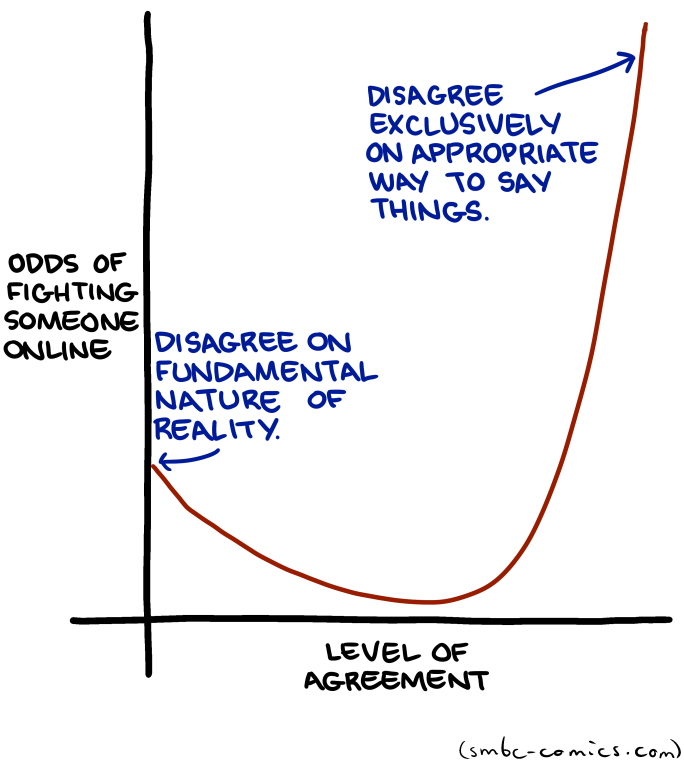Disclaimer: In this post, I will be overtly theoretical. I'm going to make many theoretical claims without rehearsing the arguments for them. If this is a problem, I will just delete this post.
"You cannot not want rights."
I will examine this claim via a thought experiment.
Imagine that you're in a store, a Wal-mart (an appropriately evil MNC). The power goes out, the lights are off, no can see you. No one, including the state, could ever know if you picked up a bunch of things from the store and then left (this is hypothetical just run with it). This is your pure
moment of resistance, do you
live by the narratives of property rights/ownership that the forces of SOCIETY (!!!) have inculcated in you? Or do you walk out with a bunch of free things that you, as a poor person, need?
The goal of this 'thought-experiment' is to imagine a situation where it would be possible to resist 'culture' (in the broadest sense!) without being pacified, or compromised, by it's contradictory edicts (it's norms, procedures, laws, 'subject categories', available identities: all of these are internalized modes of surveillance).
In such a situation, one could imagine that it would be possible to not want 'rights'.
The confusion that I encounter:
What does it mean to 'want a right'?
Which is related to the most important question, which is, what do you mean by a 'right'?
A material, or concrete, understanding of rights, cannot distinguish between a 'right' to a thing and the potential to access it. After all what is the use of possessing this thing, called a right, if I do not have access to whatever object, service, or benefit that I am alleged to 'have a right to'? If I live in a podunk town in wyoming, the nearest abortion clinic might be 100 miles away, im poor and dont have a car, there are 'no' public transit services, guess it doesn't matter that i have a right to an abortion because I dont have
access to one.
(What use is the right to marry who i want if i have no one who i want to marry)
If I do not want to marry, does it follow that I do not want the right to marry?
Many rights will not even be instantiated prior to your coming under the criminalizing gaze of the state apparatus. Most of the rights you have are only available to you after you have come to the attention of the legal system.
What we arrive at, in imagining 'wanting rights' or 'not wanting rights,' is
litotes: a break down in meaning. To steal or not to steal in the thought experiment I wrote has no meaning as an act of resistance or as an act of complicity. 'pure' acts of resistance seem to be necessarily meaningless.
more theory:
when it comes down to it: property, rights, etc are all just internalized social narratives that we live by because we are criminalized or stigmatized for deviating from them (in the thought experiment, the situation is such that you will not be stigmatized or criminalized for taking the things). The codified enumerated juridical rights (like a constitution that says 'you got a right to x,y,z in s, r, t contexts') co-determine (with many other factors which I could not begin to examine) the socio-psychological constraints on an individual's ability to act, even in the absence of imminent legal threat. 'The state lies within us and acts through us'
Individual's 'rule themselves', but even as they construct narratives, which are the conscious 'unfoldings' of their experience, the process of narrative construction takes place through language, which imposes pre-determined meanings and possibilities on the narratives an individual will construct (see wittgenstein to complete this proof: that meanings and hence narrative possibilities are pre-determined by culture vis-a vis the process of language acquisition. Wittgenstein's private language arguments+Foucault/Nietzsche panopticon/ecco homo, a 'proof' from linguistics
could follow from a rejection of linguistic structuralism, which is the belief that grammatical structures correspond to structures in the brain).
elcheeso My argument is even stronger than 'don't support problematic things.' At the very last, it shows that any act that could be imagined to be 'unproblematic' has no discursive meaning.
We must re-imagine the 'binary' that divides theory from praxis (activism).
This binary is, at last, the source of our confusion.
http://www.ucis.pitt.edu/asc/conference/alas/pdf/2010/Visweswaran.pdf
"Such a delusion (the binary) may lead to what she calls 'the [queer] [activist's] dilemma',
in which the [activist] inevitably betrays (or, I might add, is betrayed by) some feminist principle."
Of course, in the specific instance of marriage equality, I think that the perpetuation of state sanctioned marriage is more problematic than not letting gay people get married. This is why I asked if anyone wanted to get married. The legal procedures and logics of marriage are really fucked up. I would feel bad if people, in their innocence, decided to go down to the court house and pick up a marriage license.
The problem of finite resources indicates that some prioritization of causes is in order. I do not prioritize marriage, in fact, it is not on the list of causes I will ever be giving my time and money to.
If it came to a vote, I would vote yes. But I would argue against supporting campaigns to get such an issue put on the ballot because that money could go to something that i care more about, such as 'the environment'






























